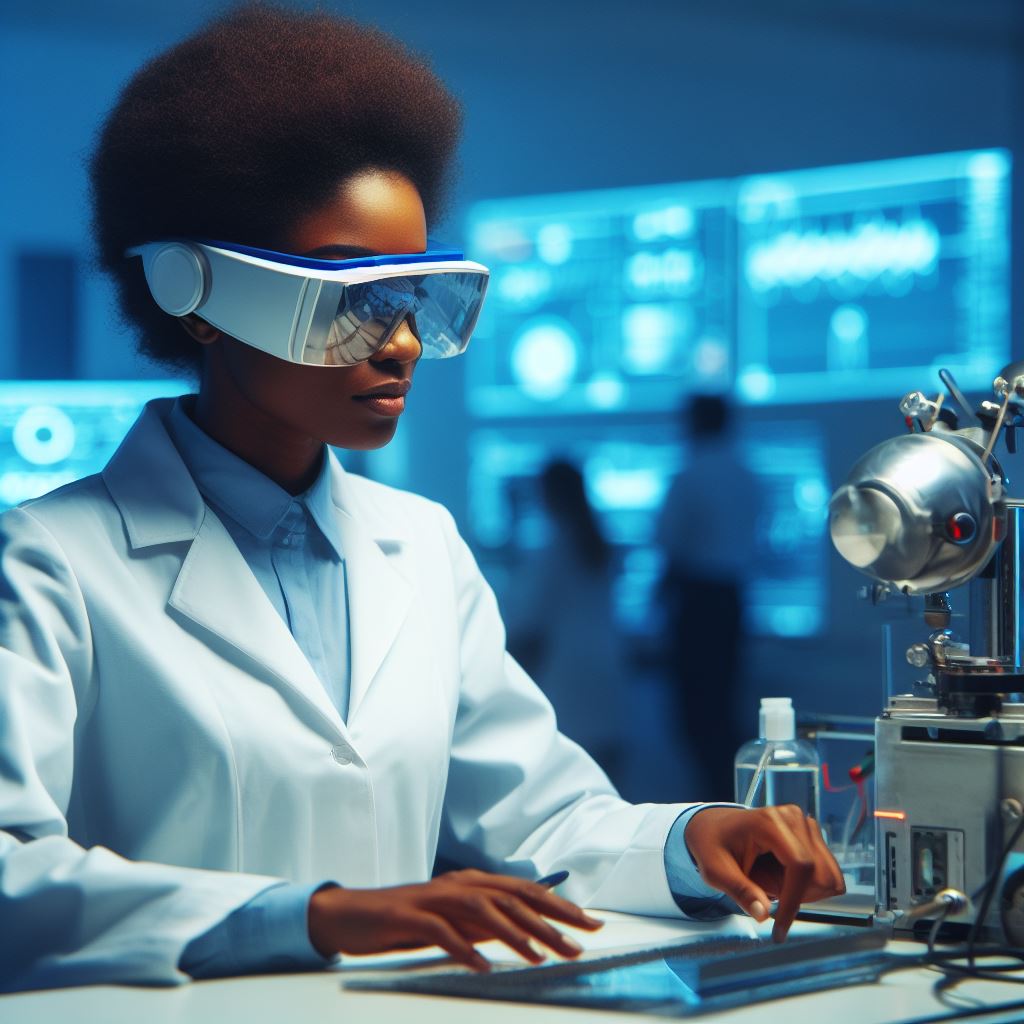Introduction
Nigeria, like many other countries, faces both challenges and opportunities in the field of physics.
Physics is a crucial subject that plays a significant role in the development of a nation.
By studying physics, Nigeria can unlock its potential for scientific innovation and technological advancements.
It is necessary to address the challenges faced in this field to seize the opportunities for growth and progress.
Challenges in Physics Education
The field of physics education in Nigeria is faced with numerous challenges that hinder its progress and development.
These challenges include inadequate funding, shortage of qualified teachers, lack of properly equipped laboratories, and limited access to quality textbooks and educational materials.
Inadequate Funding for Physics Education
- In Nigeria, physics education suffers from a lack of financial support and investment.
- Insufficient funding hampers the development of infrastructure, curriculum, and research in the field.
- As a result, institutions offering physics education struggle to provide quality learning experiences for students.
- The insufficient funding also affects the ability to attract and retain talented and dedicated physics educators.
Shortage of Qualified Physics Teachers and Instructors
- Nigeria faces a scarcity of qualified and competent physics teachers and instructors.
- This shortage hinders the effective teaching and learning of physics at all levels of education.
- Students suffer from a lack of guidance, mentorship, and proper understanding of fundamental physics concepts.
- The shortage of teachers also leads to large class sizes, making it challenging for individualized instruction.
Lack of Properly Equipped Laboratories and Resources for Practical Experiments
- Physics education in Nigeria lacks well-equipped laboratories for practical experiments.
- Many schools and institutions struggle to provide the necessary equipment and resources for hands-on learning.
- This lack of resources inhibits students’ ability to grasp theoretical concepts through hands-on experimentation.
- It also limits their exposure to real-world physics applications and practical problem-solving skills.
Limited Access to Quality Physics Textbooks and Educational Materials
- Access to quality physics textbooks and educational materials is limited in Nigeria.
- Many schools, especially in rural areas, lack up-to-date textbooks and supplementary resources.
- This hinders students’ ability to engage with the subject matter and stay abreast of scientific advancements.
- The limited access further widens the gap between privileged students and those from disadvantaged backgrounds.
Addressing these challenges requires a multi-pronged approach involving government intervention, collaboration between educational institutions, and partnerships with private and international organizations.
Adequate funding must be allocated to improve infrastructure, procure necessary equipment, attract qualified teachers, and develop relevant curriculum materials.
Additionally, efforts should focus on training and supporting physics teachers to enhance their pedagogical skills and subject expertise.
Providing increased access to quality physics textbooks and educational materials can be achieved through the development of digital platforms and online resources.
By addressing these challenges, Nigeria can create a conducive environment for the growth and advancement of physics education, nurturing a new generation of skilled physicists to contribute to scientific progress and national development.
Read: Innovation in Photonics: Nigeria’s Contributions
Limited Research and Development Opportunities
In Nigeria, physicists face numerous challenges when it comes to research opportunities and development.
These challenges not only hinder their personal growth but also impede the progress of physics as a scientific field in the country.
Limited Research Opportunities for Physicists
Physicists in Nigeria struggle to find adequate opportunities for conducting research.
The number of research institutions and facilities dedicated to physics is insufficient, resulting in a scarcity of resources and funding.
Moreover, the lack of government support and investment in research further compounds the problem.
This limited access to research opportunities stagnates the growth and innovation in physics within the country.
Lack of Collaboration between Researchers and Industry
Another challenge in Nigeria’s physics landscape is the lack of collaboration between researchers and industries.
The absence of strong linkages and partnerships between academia and industry limits the practical applications of physics research.
Efficient collaboration between researchers and industry is vital for translating theoretical advancements into practical solutions and technological innovations.
Without this collaboration, potential breakthroughs often remain confined to academic papers rather than benefiting society at large.
Brain Drain: Talented Physicists Seeking Opportunities Abroad
One significant consequence of limited research and development opportunities in Nigeria is the brain drain.
Talented physicists often leave the country in search of better prospects abroad.
These talented individuals, with their expertise and potential, are compelled to seek better-funded research projects and more supportive research environments outside of Nigeria.
This brain drain contributes to the loss of intellectual capital and further stagnation of the local physics community.
Importance of Research and Development in Advancing Physics
Research and development play a crucial role in advancing physics and driving technological advancements.
They are the key drivers behind innovations and breakthroughs that shape the future of the field.
Investing in research and development creates a conducive environment for physicists to explore new concepts, theories, and practical applications.
It also fosters collaborations, leading to knowledge exchange and the development of new techniques and methodologies.
Moreover, research and development contribute to economic growth by promoting technological advancements and attracting investments.
By prioritizing research in Nigeria’s physics sector, the country can foster innovation and pave the way for socio-economic development.
In fact, Nigeria faces significant challenges in terms of limited research and development opportunities in physics.
The scarcity of research opportunities, lack of collaboration between researchers and industry, and brain drain hinder the progress of physics in the country.
However, by acknowledging the importance of research and development and investing in these areas, Nigeria can unlock its potential for scientific advancement and socio-economic growth.
Read: Leading Companies in Photonics in Nigeria
Government Support and Initiatives
The Nigerian government recognizes the importance of promoting physics education and research in the country.
Efforts have been made to enhance physics learning through specific initiatives and programs.
However, consistent government funding and long-term planning are essential to sustain these efforts.
Efforts to Promote Physics Education and Research
- The Nigerian government has prioritized physics education by including it in the national curriculum.
- Physics departments and research institutions have been established in universities and research centers.
- Government agencies, such as the Nigerian Institute of Physics, have been created to oversee and promote physics education and research.
- The government has encouraged collaboration between universities, research institutions, and industries to foster innovation and practical application of physics knowledge.
Specific Initiatives and Programs
- The establishment of dedicated physics laboratories with state-of-the-art equipment has improved the practical learning experience for students.
- The government has initiated scholarship programs to support students pursuing physics-related degrees at both undergraduate and postgraduate levels.
- Physics competitions and science fairs have been organized to nurture talent and encourage students to pursue careers in physics.
- The Nigerian government has supported the participation of physics students and researchers in international conferences and workshops to foster knowledge exchange and collaboration.
Need for Consistent Government Funding and Long-term Planning
While the Nigerian government has taken steps to promote physics education and research, consistent funding and long-term planning are crucial for sustained development in this field.
Firstly, adequate funding is necessary to maintain and upgrade physics laboratories, acquire modern equipment, and provide quality education and research facilities.
Insufficient funding hampers the ability of institutions to offer cutting-edge education and conduct high-quality research.
Furthermore, long-term planning is essential to ensure that physics departments and research institutions have the necessary resources and infrastructure to attract and retain talented faculty members and researchers.
It is imperative to invest in the recruitment and training of highly qualified educators and scientists.
Additionally, government support should extend beyond basic infrastructure and include funding for research grants and fellowships.
This will encourage physicists to pursue innovative research and contribute to scientific advancements.
Moreover, partnerships between academia, industry, and government must be strengthened to bridge the gap between theoretical knowledge and practical application.
Collaborative research projects and internships can provide valuable industry exposure and enhance employability for physics graduates.
In general, the Nigerian government has made commendable efforts to promote physics education and research.
However, consistent funding and long-term planning are necessary to sustain these initiatives and ensure the growth of physics in Nigeria.
By investing in infrastructure, faculty, research grants, and industry collaborations, Nigeria can create a conducive environment for physics education and research, leading to scientific advancement and economic growth.
Read: Photonics Applications Specialist: Job Outlook

Emerging Opportunities in Physics in Nigeria
In recent years, Nigeria has witnessed a growing demand for skilled physicists across various sectors, including energy, healthcare, and telecommunications.
This demand has created numerous opportunities for Nigerian physicists to contribute to the development and advancement of the nation.
Growing Demand in Various Sectors
The energy sector in Nigeria is increasingly relying on physicists to address the challenges of sustainable energy production and infrastructure development.
Skilled physicists are crucial in designing and implementing renewable energy solutions such as solar and wind power systems.
The healthcare sector also highly values physicists.
They play a vital role in medical imaging technologies, radiation therapy, and diagnostic equipment development.
With the increasing prevalence of cancer and other diseases, the demand for physicists in healthcare is expected to continue to rise.
Furthermore, the telecommunications sector relies on physicists to optimize communication networks, develop cutting-edge technologies, and improve data transmission and security.
Nigerian physicists are involved in research and development of advanced materials and systems for telecommunications, contributing to the growth of this sector.
Contributions to Global Scientific Research
Nigerian physicists have the potential to make significant contributions to global scientific research and discoveries.
With the right resources and support, Nigerian physicists can participate in international collaborations, tackle complex research questions, and help solve global challenges.
Through participation in major scientific projects and collaborations, Nigerian physicists can enhance their knowledge and skills, expand their research networks, and elevate the country’s reputation in the global scientific community.
This, in turn, opens doors for further research opportunities and increased funding.
Increasing Interest in STEM Education
In recent years, there has been a noticeable increase in the interest in Science, Technology, Engineering, and Mathematics (STEM) education in Nigeria.
This presents an opportunity to inspire young Nigerians to pursue physics and other STEM disciplines.
By promoting physics education at an early age, young Nigerians can be exposed to the wonders of the universe, scientific exploration, and innovation.
It is essential to provide them with the necessary resources, mentorship programs, and hands-on experiences to ignite their curiosity and passion for physics.
Furthermore, initiatives focusing on encouraging and supporting girls and women in physics should be promoted to ensure equal opportunities.
This will help diversify the field and bring forth a broader range of perspectives and talents.
Nigeria is witnessing emerging opportunities in the field of physics.
The growing demand for skilled physicists in energy, healthcare, and telecommunications sectors, along with the potential for contributing to global scientific research, highlights the significance of physics in Nigeria’s development.
Moreover, the increasing interest in STEM education and the potential for inspiring young Nigerians to pursue physics will ensure a bright future for the field.
It is crucial for the government, educational institutions, and the society as a whole to invest in the support, infrastructure, and promotion of physics education and research in Nigeria.
Read: Becoming a Physicist in Nigeria: A Comprehensive Guide
You Might Also Like: Chemist’s Contribution to Health in Nigeria
Role of Universities and Institutions
Universities and research institutions play a critical role in promoting physics education and research in Nigeria.
They serve as the backbone of the scientific community and contribute significantly to the development of the field.
Promoting Physics Education and Research
- Universities provide a platform for students to pursue physics education at undergraduate and postgraduate levels.
- They offer physics programs, courses, and research opportunities that equip students with the necessary knowledge and skills.
- Research institutions, on the other hand, focus on advancing scientific knowledge through relevant research projects.
- They provide scientists and researchers with dedicated facilities, laboratories, and equipment for conducting experiments and investigations.
- These institutions also facilitate collaborations and partnerships among physicists within and outside the country.
Successful Collaborations between Academia and Industry
- The collaboration between academia and industry is crucial in bridging the gap between theory and practical applications.
- Successful partnerships often lead to innovative solutions and the development of new technologies.
- Universities and research institutions collaborate with industries in various sectors, such as energy, telecommunications, and healthcare.
- These collaborations involve joint research projects, student internships, and knowledge exchange programs.
- Academic-industry partnerships also create opportunities for commercialization of research findings, fostering economic growth.
Need for More Infrastructure and Funding
- Nigeria faces challenges in providing adequate infrastructure and funding to support advancements in physics.
- There is a need for well-equipped physics laboratories, computer systems, and specialized equipment.
- More funding from the government and private sectors is necessary to establish state-of-the-art research facilities.
- Investments in infrastructure and funding will attract top researchers, retain talents, and enhance international collaborations.
In a nutshell, universities and research institutions in Nigeria have a crucial role in promoting physics education and research.
They foster collaboration between academia and industry, leading to successful partnerships and innovative solutions.
However, there is a pressing need for more infrastructure and funding to support advancements in physics and ensure the country’s scientific progress.
Conclusion
Nigeria faces numerous challenges and opportunities in physics education and research.
The challenges include inadequate funding, outdated infrastructure, and a lack of qualified teachers.
These challenges hinder the development of quality physics education and research in the country.
However, there are also opportunities for growth, such as the increasing interest in STEM fields and the potential for collaboration with international institutions.
It is crucial to overcome these challenges and seize these opportunities to enhance the state of physics in Nigeria.
In order to achieve this, collaboration and support from various stakeholders such as the government, academic institutions, and industry leaders are essential.
Efforts should be made to increase funding for physics education and research, improve infrastructure, and attract and retain qualified teachers.
By doing so, Nigeria can cultivate a thriving physics community that contributes to scientific advancements and technological innovation.
Ultimately, investing in physics education and research will not only benefit the country but also contribute to global scientific progress.
It is time to prioritize the development of physics in Nigeria and work together to overcome the challenges and seize the opportunities that lie ahead.




